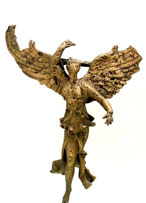| Author | |
|---|---|
| Epoch | 1926-1999 |
| Work | Lamentation (Elguja Maghradze, Two Novels, Tbilisi, 1984) |
| Type | |
| Quote | “The main problem of the ancient Greek philosophy was the solution of ontological issue […] In the understanding of ancient Greeks, the whole universe was very simple, as the creators of the universe and humans were Olympian Gods, they governed everything in the world […] But, there emerged such rebellious people in this world, as: Thales, Heraclites, Anaximenes, Xenophanes, Pythagoras and others, who […] made the Olympian Gods step down[…] According to Thales, the origin of everything is water, according to Heraclites, the beginning of everything is water […] Heraclites’ fire is equivalent to his own Logos; Heraclites’ fire is sensible and it runs everything. Heraclites’ eternal fire is the matter […] Anaximander declared Apeiron as the originator and the beginner of everything, even the space itself. For Anaximenes, the beginning of everything is air […] According to Anaximenes, constriction causes coldness and expansion-widening – warmth. For the Natural-philosophers from Miletus, as well as for the Ionians, divine naturalness is correlative {…] According to Thales, the divinity has neither the beginning nor the end […] In the opinion of Empedocles the Universe has four roots (earth, water, air and fire). It is evident, that he knows thoroughly the works of Greek learned classicists, the philosophical points of view of the learned persons of Hellenistic culture and has an access to works of the writers and thinkers of ancient time (pg. 288) |
| Term |
|

| Comment |
|---|

